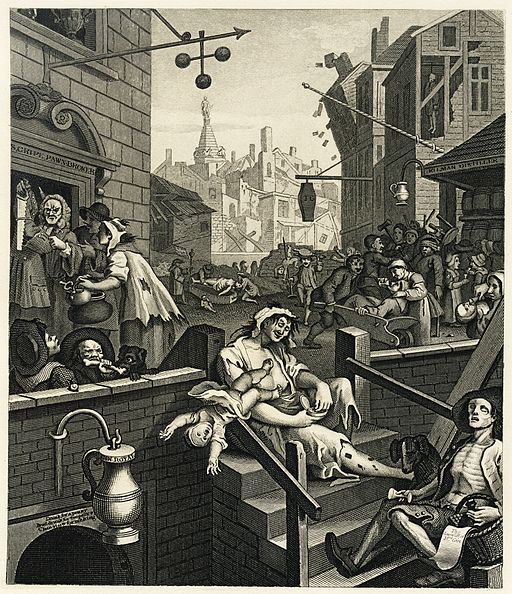I’m sure most families have standard phrases they use with one another, inside jokes that others might not necessarily get. One of my family’s is from the 1968 musical version of Oliver Twist. There’s a scene, in Fagin’s lair, where one of the pickpocket-boys shouts, “These sausages are moldy!” And Fagin yells back, “Shut up and drink your gin!”
So we’ll often snarl “Shut up and drink your gin!” to our kids (usually with a Cockney accent), whenever someone complains about the food. It’s a funny line, even in the movie, partly because it’s so shocking to modern-day sensibilities, that young boys would be drinking gin with their (moldy-sausage) lunch. But it’s historically quite plausible. Kids really did drink gin.
I have a section in my Poop Book about the gin craze of the first half of the 1700s in England. Gin drinking reached epidemic proportions in poor London neighborhoods by the 1730s. For one thing, there weren’t many options when a person wanted something to drink. Tea was still rare and pricey–almost nobody drank it at the beginning of the eighteenth century—it wasn’t until trade routes with China opened that tea became available (another shameless chapter of British history which I’ll eventually blog about). The water was polluted, milk was unsafe, and wine was heavily taxed (due to war with France).
In contrast, gin was cheap, reasonably tasty, and highly intoxicating. It quickly became cheaper as more and more people made and sold it illegally. The British government was duly alarmed by the drinking in the laboring classes, because gin disabled people for useful labor. All kinds of legislation was passed to regulate the spirits trade, but the regulations went largely unenforced—in the large and still-growing working class neighborhoods, few police patrolled the neighborhoods. Selling gin was one of the few occupations available to women, way preferable to prostitution, and gin shops were an attractive social option for females who didn’t feel like hanging around in the seedy alehouses. Gin shops popped up on practically every street corner.
You could get intoxicated for a penny and roaring, falling-down drunk for three. Night-soil men were rewarded with a bottle of gin as a tip after shoveling out a homeowner’s cesspit. In poorhouses, babies were given gin to quiet them. Often, tragically, the quiet was permanent.
